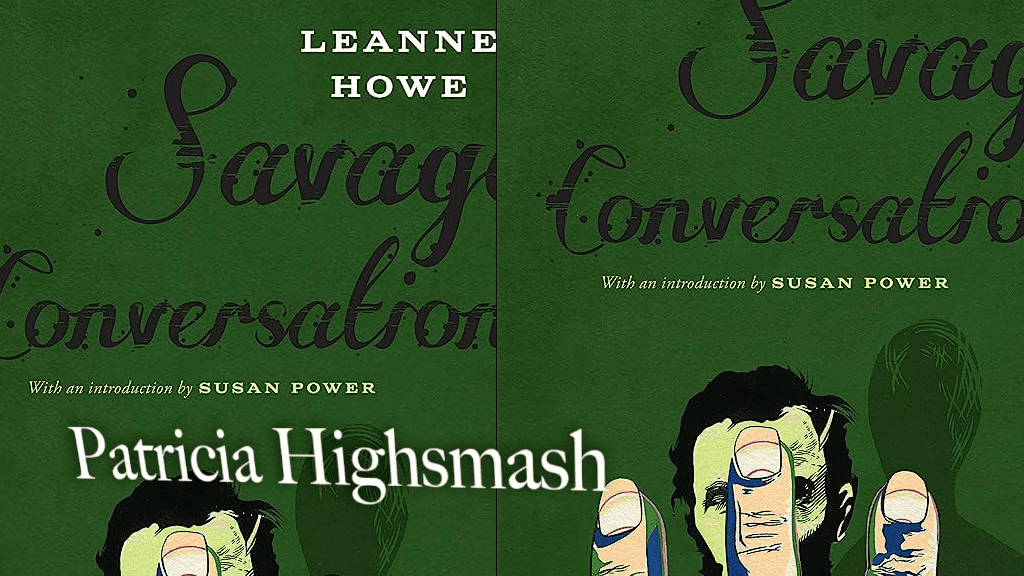Patricia Highsmash
LeAnne Howe and Savage Conversations
Travis Hedge Coke
[Originally presented at AWP ’23, during the panel, Singing Still: A tribute to LeAnne Howe]
“I was an abolitionist,” says Mary Todd Lincoln.
In response, Savage Indian says, “And a killer of children.”
“Out of Fort Snelling’s coffin,
I swing like a fool on holiday.”
Words of the Rope tie together Leanne Howe’s Savage Conversations. Rope, the third character in this work, a character as unalive, as inanimate, as personable as Mary Todd Lincoln and Savage Indian. The Rope is engaging, it is tangible, it is cosmogenic.
In Rope we truss.
There is a feverish, catalytic purification in Savage Conversations, dependent on that dividing factor that cannot be a wall, step, stream or a fence.
The invigorating flavors of offense taken by readers, by reactors and actors, to Savage Conversations, are fueled by history, presentiment, and the present.
Becky Loader, author of nearly twelve hundred reviews on Goodreads, says that Howe, “has a lot of hate.” She is convinced that much of this fictional work, in which a hanging rope speaks and takes independent action, is not entirely based on demonstrative historical fact.
Elsewhere, I have seen rage and disquiet that Savage Conversations might not be a story, but a poem, it might not be a poem but fiction, it might not be fiction, but a play.
It might be a conversation, but nobody is talking to each other.
A conversation in which a conversant is incapable of engaging, read, reviewed, raged against by an audience unwilling to – I refuse that they are incapable – unwilling to engage.
Savage conversations is about Savage Indian and Mary Todd Lincoln in conversation, but it is also conversation with its many audiences. It is about its many audiences.
They are as absent as the illustrations that are not included in this work.
“And now a bloody red tongue unspools.”
– The Rope
When Mary Todd Lincoln says, “A wild savage cut me,” “He gave chase around the school yard,” when she declares to Savage Indian, “You cannot read the Bible or quote Shakespeare!” she is formulating excuse for her situation but it is, conveniently, the truism and received wisdom of colonialist literature and culture. American history as it is taught and taken in.
I was recently hurt to read a white writer of Native history framing contemporary America as the 19th Century white Americans who desired to believe these myths so much, while disregarding Native Americans then as not American and those today? Any nonwhite Americans today? Simply unspoken of. Erased.
Whether Savage Indian is ghost, delusion, excuse, a bitter sliver of conscience, they are allowed their place in dialogue with Mary Todd Lincoln because they may be ghost, delusion, Jiminy Echo Echo Cricket. Yet, if I was to say Mary Todd is an emblem of guilt, avoidance, convenience, the entirety of Americana would rise and destroy me in my hubris.
Savage Conversations allots them both their space and their lack of space, a world that has conspired to deny them very unequal presence.
Nathan Scott McNamara, in his review, touches on Savage Indian and the real life Mankato executions, thusly: “Largely ignored throughout much of American history, the memory of this event was partially reignited after President Barack Obama…”
Well-meant, erudite, this erases that throughout that history there have been people who never forgot. Native people did not forget.
“When will I wake?” asks Savage Indian.
In a horrible, but real way: When white people decide it is so.
“When will I wake?” asks Savage Indian.
Like the illustrations mentioned in the book, but never seen, this waking and even Savage Indian are uncertain, maybe unanswerable, because the answer is being left to Mary Todd and to the Rope.
Waiting for the acknowledgement could be a wait that lasts the rest of the world.
As when Mary Todd Lincoln speaks of a woman she feels replaced by.
“[She] captured his imagination. And that was that,” she says.
Says Savage Indian: “True.”
